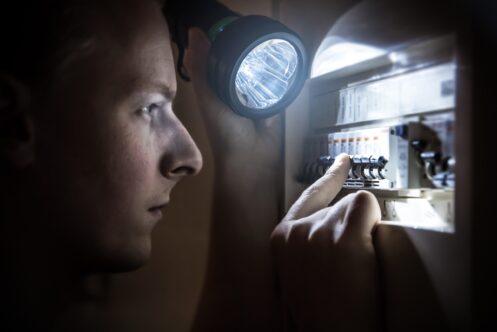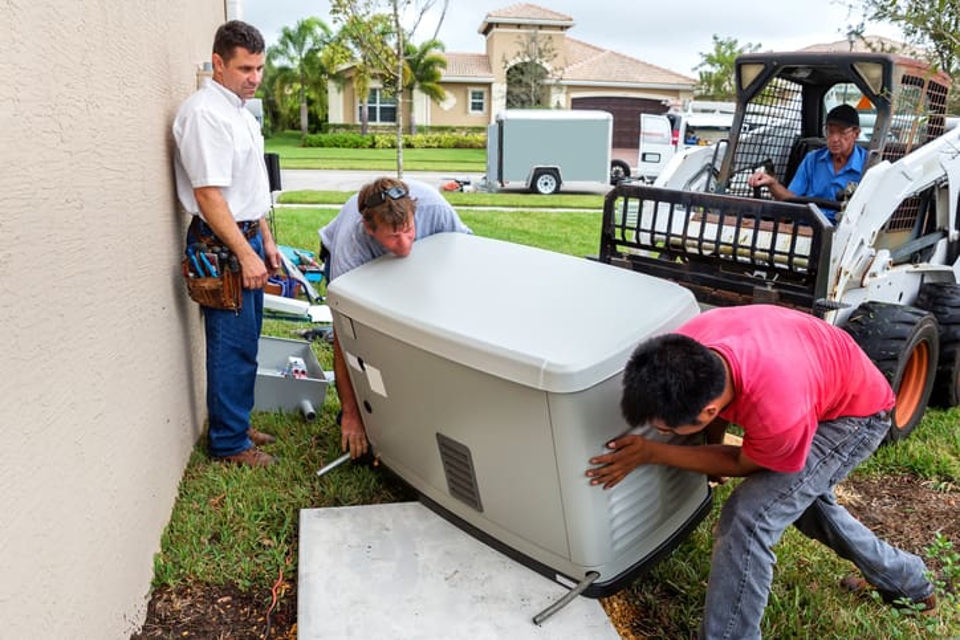Flickering lights can have a range of causes. Some are harmless, but others can signal a more serious issue. Here is what might be going on and what you can do to fix it.
Problems with the Power Grid
Sometimes, the issue is not inside your home at all. If your neighbors are also experiencing flickering lights, it might be a problem with the municipal power grid. There might be an overloaded transformer or a failing power line.
If multiple homes in your neighborhood have the same issue, contact your utility provider to report it. They may need to inspect and repair their equipment.
Loose Bulbs or Wiring in Fixtures and Lamps
If a single lamp or fixture starts to flicker, it could be something as simple as a loose bulb. When a bulb is not screwed in securely, it may not have a steady connection with the socket, causing it to flicker or dim intermittently. Start by turning off the light, allow the bulb to cool, then tighten it carefully.
If tightening the bulb does not help, the next step is to replace it with a new one. Newer LED bulbs, in particular, need a solid connection to work correctly. If the new bulb also flickers, the issue likely lies with the fixture or lamp rather than the bulb itself. Loose wiring inside the fixture, worn-out sockets, or minor damage to the lamp’s cord can cause issues.
You should not continue to use a lamp or fixture that flickers. It could have an electrical problem that could pose a fire risk. Replacing a lamp or having a professional repair a fixture is usually the best solution.
Appliances Causing Voltage Drops
If your lights flicker when a major appliance kicks on, it could be due to a voltage drop. This usually happens when appliances like refrigerators or air conditioners start. They draw a lot of power to get moving, which can briefly pull electricity away from other parts of your home and cause nearby lights to flicker.
This kind of flickering is not usually a safety issue. However, having an electrician take a look is a good idea if it happens often. Sometimes, it could mean an issue with your electrical panel or that a circuit is overloaded. Another possible cause is a faulty starter capacitor in the appliance, which could be making it struggle to start properly. Either way, it’s worth getting the issue checked out for electrical repair before it leads to bigger problems.
Circuit Overload
In many homes, people use more power than their system was designed to handle. This happens a lot in older homes. Running several high-wattage appliances or electronics on the same circuit can overload it. Often, that leads to flickering, buzzing, or even tripped breakers.
You will want to pay attention to which outlets and lights are affected. If the flickering always happens when you use the microwave and toaster at the same time, that is a clue. You may need to move some appliances to different outlets.
Loose Wiring or Connections
If the flickering is widespread or unpredictable, it could point to a loose connection somewhere in your home’s wiring. This might be inside a wall switch, in an outlet, or hidden behind the walls.
This is not a problem you should try to handle on your own. Loose or damaged wiring can cause arcing, a dangerous situation where electricity jumps between connections instead of flowing through wires the way it should. Arcing generates significant heat and is a major fire hazard. If you suspect a wiring issue, call a licensed electrician immediately to diagnose and repair the problem.
Main Electrical Panel Issues
If multiple lights across different rooms are flickering and you have already ruled out other causes, the problem may lie in your main electrical panel. Faulty breakers, corroded connections, or a loose neutral wire can all cause system-wide flickering. These issues create serious safety risks, including the potential for electrical fires, and need to be addressed right away.
This is not a DIY fix. A licensed electrician will need to inspect your panel and determine whether repairs or upgrades are necessary. If your home still has an outdated fuse box or an older service panel, it may be time to consider a full replacement to ensure your system can safely handle your household’s electrical needs.
How to Tell When Flickering Is a Serious Issue
Flickering lights can often be chalked up to something minor. But in some cases, flickering is more than an inconvenience. This can be an early warning sign of a serious electrical problem that puts your safety and home at risk. Knowing when flickering crosses the line from annoying to alarming is important to protect your family and property. Here are the warning signs you should never ignore.
Flickering Lights with a Burning Smell
If you notice a faint burning odor or your switches feel warm or hot to the touch, shut off the affected circuit immediately. It is time to call an electrician. These symptoms can indicate arcing or overheating, which are serious fire hazards.
Buzzing or Crackling Sounds from Outlets or Electrical Panel
Unusual noises often indicate loose wiring or other dangerous issues inside your system. These problems can quickly escalate. A licensed electrical repair professional should handle them as soon as possible.
Lights That Stay Dim When Major Appliances Turn On
If the lights in your home dim whenever a major appliance starts and do not return to normal brightness, it could be a sign that your electrical system does not have enough capacity.
If left unresolved, it can strain your entire system and increase the risk of equipment damage or electrical fires. In some cases, you may need to upgrade your home’s electrical service, which means increasing the amount of power your home can safely use at one time. A service upgrade typically involves replacing your main electrical panel with one that can handle a higher amperage, such as moving from 100 amps to 200 amps. It may also require updating the wiring between your home and the utility service line.
These upgrades help ensure that your appliances and electronics receive consistent, reliable power. Consistent power is especially important for computers, laptops, and modern appliances that contain sensitive electronics. An uneven power supply can cause them to wear out faster than they should. A service upgrade can also prepare your home for future needs, such as installing an electric vehicle charger or expanding a home office. A licensed electrician can evaluate your system and recommend whether repairs, panel upgrades, or a full service upgrade are necessary.
Contact Your Local Electricians
At Swift Brothers, we have proudly served the residents of Charlotte, NC and the surrounding areas for years. If you’re concerned about flickering lights in your home, our team can perform a thorough electrical inspection. You can rely on us for electrical services like panel upgrades, rewiring, or repairs to ensure your home is safe and up to code. Contact us today to schedule an appointment with one of our experienced electricians.
The post Lights Flickering in Your Home? Here’s What Your Electrical System Is Telling You appeared first on Swift Brothers.





